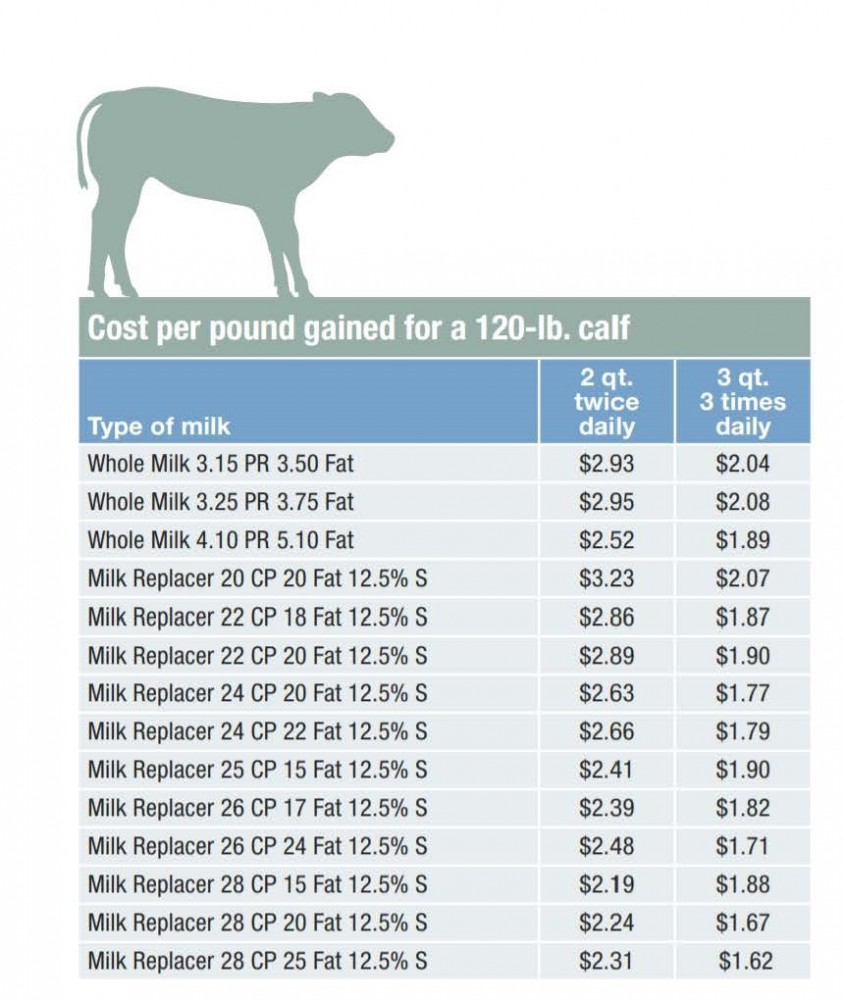Feeding More Milk to Make More Milk
Alycia Drwencke, Dairy Management Specialist
Southwest New York Dairy, Livestock and Field Crops Program
Dr. Valerie Smith with Dean Foods Dairy Stewardship Program is a licensed veterinarian and expert in dairy cattle health and welfare. Dr. Smith is certified by the National Milk Producers Federation as a F.A.R.M. auditor and trainer, and by PAACO(Professional Animal Auditor Certification Organization) as a DairyWell auditor. As part of Dean's December update, Dr. Smith shared information on how feeding calves larger quantities of milk can result in greater production later in life.
Feed More Milk to Make More Milk, Dr. Valerie Smith
"Feeding more milk will result in the calf gaining more lbs per day, which will reduce the cost per pound gained. This will reduce the cost of raising dairy replacement heifers and the heifer will enter the milking string at a younger age, therefore increasing profitability. The amount of weight a heifer gains daily is directly correlated to milk production, so if a producer maximizes how much weight is gained early, then they will receive more milk when the animal enters the milking herd.
Calves that gain weight at a faster rate will have reduced medicine costs for disease treatments, will have lower mortality rates and actually require less labor. These heifers will reach breeding height and weight sooner, calve at an earlier age and produce more milk than heifers that are raised on 2 quarts of milk twice a day with calf starter, and thus result in a higher profitability. Calves fed a full-potential liquid diet versus a more conventional diet will eat as much or more starter at weaning than calves fed a lower amount of milk nutrition. Making calves eat too much dry feed at younger ages is actually detrimental to rumen development.
When can you start feeding at an increased rate? Immediately. Best practice would be 3 to 4 quarts colostrum within 1 to 4 hours after birth and 2 additional quarts within 12 hours after. On days two and three feed transition milk at 2 quarts three times daily. And while 3 quarts twice a day is better than the traditional 2 quarts 2x daily, it's still not enough to give calves the nutrition needed to reach their full potential for growth and development. Feeding a full potential diet of at least 8 to 9 quarts of liquid per calf per day - delivered in 3 quarts three times a day or 4 quarts twice day - can help calves achieve optimal performance. Not doing so will limit heifers from reaching their full potential.
A common misconception is that more nutrition can cause scouring: Manure may appear loose, but it is not truly scours. An increase in liquid manure is due to the higher level of milk nutrients consumed. It is always a good idea to consult your veterinarian before determining the cause of calf diarrhea.
Also, feeding through a bottle with a nipple rather than a bucket, will help slow down the passage rate and increase salvia. Having saliva adds more enzymes that promote protein and fat digestion.
If you want to know more about feeding heifers for their full potential contact your local Dairy Stewardship specialist."

*Dairy Herd Management, Robert B Corbett DVM, PAS May 18 2018
You can learn more about The Dean Foods Dairy Stewardship Program on their website.
Upcoming Events
WEBINAR - Automated Milking Systems Efficiency: Balancing Focus on Individual Cows and System Optimization
May 8, 2024
Please join Cornell the SWNY team and MSU Extension for our talk with Dr. Pablo Silva Boloña on improving efficiency of Automated milking systems by focusing on milking settings for individual and group success.
Broiler Field Day at Sunny Cove Farm
June 6, 2024
Alfred Station, NY
Join us for a field day to explore broiler production, processing, and finances. Meghan Snyder of Sunny Cove Farm will be our host. She raises small batches of organic broilers, processing them on-farm under the 1,000 bird exemption.
Cornell Seed Growers Field Day
July 2, 2024
Ithaca, NY
Please Save the Date for the Cornell Seed Growers Field Day to be held the morning of July 2nd. The event will be held at the NYSIP Foundation Seed Barn, 791 Dryden Rd., Rt. 366, Ithaca, NY.
Announcements
No announcements at this time.





